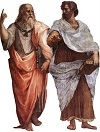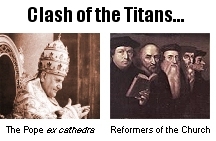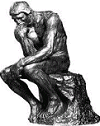|
The problem with attempting to understand the "Greek mindset" is twofold: 1) it is so all-pervasive that it lies below the threshold of our daily assumptions, and 2) ironically, the very attempt to define it is a function of the Greek mindset itself....
To begin to understand some of this, we need to go back to ancient Greece and appreciate its tremendous influence in western intellectual history. The modern university, for example, was modeled after the ideals of Plato's Academy in which (it was hoped) the entire "universe" would be explained within its halls. For Plato (428-348 BCE), this meant apprehending unchanging universals (╬Ąß╝Č╬┤╬┐Žé, forms, ideas) that were believed to be revealed to the rational intellect through a process of "dialectical abstraction." The everyday world of particulars is always in a state of flux. Inferences regarding its objects are really just opinions based on sensations. The "real world" is the supra-sensible realm of ideals, and inferences regarding these objects constitute true and abiding knowledge (ß╝ÉŽĆ╬╣ŽāŽä╬«╬╝╬Ę). The highest of all ideals is that of "the Good," the transcendent source of all value in the universe.
To the Greek mind, truth (ß╝Ć╬╗╬«╬Ė╬Ą╬╣╬▒) is generally understood as "justified true belief," that is, a matter of correspondence between our mental states (or language) and reality. The idea of justification means that the proper use of language yields a well-defined object of correspondence: if there's truth about the physical world, that world exists, just as if there is truth about the ideal world, that world likewise exists. This led to a sort of dualism in both nature and in man -- there is the real and the ideal; the "is" and the "ought," and so on. The world of Forms is the true, high, and good world; this world of incessant flux is a "copy" that "participates" in the heavenly realm.
One famous example Plato used was that of a triangle (the Meno). Mathematics can demonstrate a triangle's essential properties, but these properties are not directly experienced in any particular triangles you might encounter. Only by apprehending the "idea of triangle" can we classify if this particular thing partakes of the essence of triangularity. Essential ideas are regarded as something innate that were lost in the soul's "descent" into this world. Education - literally "leading out of [the cave of ignorance]" - is a process of the soul's "recollection" of forgotten ideas as mediated through the services of an intellectual midwife (i.e., teacher).... In the Republic, Plato illustrates these concepts using the metaphor of the sun, the divided line, and the allegory of the cave.
Plato's most famous pupil was Aristotle, who later became the tutor of Alexander the Great. Aristotle attempted to redirect the thinking of his mentor by insisting that universals (forms, ideas, etc.) are to be found -- not in some abstract realm -- but in the particular things themselves. We come to know, in other words, by abstracting from the particulars we observe to form a more general understanding of a thing's formal or essential nature.

In either case, however, the business of the mind is to understand things in terms of their (static) generalized essences. There is appearance and there is reality, and this fundamental distinction led to a radical subject/object dualism that tied logic to the knowing subject. Taxonomies, categories, precision in definition, the use of logic, etc., were meant to penetrate the inner meaning of existence to discover its universal and timeless truths. God or heaven, for these ancient Greeks, was an "Unmoved Mover" or an infinite Mind that contemplated its own inner perfection. Even the word "theology" itself (╬Ė╬ĄßĮĖŽé + ╬╗ßĮ╣╬│╬┐Žé) is regarded as the "science of a god," a systematic (and rational) presentation of the idea of god according to the dialectic of human reason. Hence we see Plato's theology of the Good and Aristotle's Unmoved Mover take their place as the overarching metaphysical explanation of the ground of reality itself.
Most of western thought -- including ideas about language and logic, natural science, mathematics, ethics, jurisprudence, politics, aesthetics, theology, and so on, draws from this tradition, and much has been subconsciously adopted into the educational technologies of the west for thousands of years. So enormous has been the influence of Plato that Alfred North Whitehead once remarked that "the safest general characterization of the European philosophical tradition is that it consists of a series of footnotes to Plato" (Process and Reality). And since the early Roman church was led by orators and others schooled in classical Greek thought (i.e., Hellenism), many of the basic assumptions of the Greeks were implicitly integrated into the earliest forms of Christian theology. Paradoxically (and perhaps tragically) the early western church therefore became a carrier of the legacy of ancient pagan thinking. Thus we find two of the greatest theologians of the Christian world - Augustine and Thomas Aquinas - attempting to synthesize Greek philosophy with the Scriptures (Augustine following Plato and Aquinas following Aristotle). It's not empty blather, therefore, to suggest that the western Church eventually absorbed as much from Athens as it did from Jerusalem.
The Hebraic mindset, on the other hand, was not concerned with these abstract ideas of the ancient Greeks. Because of the direct revelation of YHVH (ūÖūöūĢūö), reality was regarded in terms of divine encounter, dialog, antinomy, paradox, mystery, and so on. Hebrew thinking therefore tended to be more dynamic, more poetic, more dramatic, more "phenomenological" (based on appearances), and more impassioned than that of the ancient Greeks. Just as the ancient Hebrews did not ask, "What is truth?" or "What is the nature of the good?", neither did they ask "What is time?" To the Hebrew mind, time is rooted in historical experiences such as the Exodus from Egypt and other "appointed events" (moedim). Time is therefore linked not so much to chronology as it is to spiritual significance. Therefore the Exodus event is reenacted every year during Pesach, the giving of the Torah at Shavuot, and so on. Unlike Greek speculations about time as a substance or medium or "dimension," in Hebrew thinking events are the focus, not the supposed substratum for these events.
Since the Hebrews dealt with the drama of Divine revelation that was eventually committed to writing (i.e., the Torah), hermeneutics and interpretation became important in their overall perspective. The study of narrative, the layered sense of meanings, the focus on action (rather than static being), the application Divine law to particular cases, etc., were the result of interpreting the transcendent and immanent within everyday life. This explains (in part) why Judaism has never been strongly represented in the realm of Greek philosophy and philosophical theology. Jewish Theology has been conditioned by debate, discussion, and dialog -- all within a shared sense of communal tradition. Consider the Talmud, for instance, where we see ongoing debate and discussion regarding matters of Jewish law alongside midrash and homiletic literature. This can be summed in the expression, shiv'im panim laTorah: "the Torah has 70 faces," meaning that different perspectives on paradoxical issues should all be given their voice:
Mordcha: Why should I break my head about the outside world? Let the outside world break its own head.
Tevye: He is rightŌĆ”
Perchik: Nonsense. You can't close your eyes to what's happening in the world.
Tevye: He's right.
Rabbi's pupil: He's right, and he's right. They can't both be right!
Tevye: You know, you are also right!
[From Fiddler on the Roof]
To the Hebrew mind, reality is the handiwork of a single all-knowing, all-powerful, and Supreme Creator who has personally revealed Himself to key individuals in human history. As such, reality is intensely, overwhelmingly, and even hauntingly personal... Truth therefore is a matter of trust -- not abstract knowledge -- whereas "knowledge" is primarily about practical ethics, moral obligation, and cult practices (i.e., Temple worship). For the Hebrew mind, truth is more akin to moral fidelity than it is to propositional correspondence; it is more a matter of the heart than of the head...
From its earliest days in Rome, the Greek mindset has been hugely influential in shaping the vision of the "church" -- its structure, mission, "theology," and its ways of doing business. The roles of the earliest "Church fathers" and apologists is a study of Greek oratory and dialectic. And even though the so-called "Reformation" of the church in the 16th century tried to restore a primitive Christian expression, it failed (ironically enough) because it went back to ancient Greek humanism rather than to the Jewish roots of the Christian faith. The ideal of Zion as a real, physical future continued to be allegorized, just as the Church continued to mistakenly regard itself as "Israel." Perhaps the greatest exegetical fallacy was the veneration of absolutist forms of theology -- a Greek legacy that comes more from the Academy of Plato than it does from Moses... This is the hubris of "Greek philosophical theology" and explains in no small measure the various disagreements among Christian "denominations" that persist to this day.

"Philosophy in relation to Christianity is like someone accused before the Inquisition who makes up a story which coincides in all essentials
yet is altogether different." - Kierkegaard, Journals
Of course, much of this entire discussion is a bit artificial, especially in light of the fluidity of cultures and the fact that Hellenization affected the Jews as much as other people groups. Hellenistic Judaism, for example, sought to syncretize Hebraic-Jewish religious tradition with the culture and language of the Greeks. The major literary product of the contact of Judaism and Hellenistic culture was the Targum Hashiv'im (Septuagint or LXX). Therefore we see the Jewish theologian Philo of Alexandria (c. 50 BCE) attempting to synthesize Plato with Moses, just as Maimonides (1135-1204) later attempted to synthesize Aristotle with traditional Jewish dogma. The same syncretism is found in Islamic theology as well.
Christian theology has always had those among its ranks who, like the Hebrew Maccabees, opposed syncretism with the Greeks. For example, the early church leader and orator Tertullian (160-220 CE) once quipped, "What does Athens have to do with Jerusalem?" His question was meant to suggest that matters of faith and matters of speculative reason are in different "worlds," and that the Christian was to live according to the dogmas of faith (Tertullian is also attributed with saying, "I believe because it is absurd"). This approach is sometimes called fideism ("faith-ism") and is usually contrasted with "natural theology" (i.e., the idea that knowledge of God can be attained through reason alone -- apart from special revelation). Tertullian might have gone too far in his reaction against reason, however, since he later became something of a theological absurdist whose mysticism promoted the errors of replacement theology. Ironically his separation of "Athens from Jerusalem" made the latter a mystical ideal of the Gentile world rather than the promised hope of the Jewish people. But that's another story....
"I refuse to prove that I exist," says God, "for proof denies faith, and without faith I am nothing."
"But," says Man, "the Babel fish is a dead giveaway isn't it? It could not have evolved by chance. It proves that You exist, and so therefore, by Your own arguments, You don't. Q.E.D."
"Oh dear," says God, "I hadn't thought of that," and promptly vanishes in a puff of logic.
"Oh, that was easy," says Man, and for an encore goes on to prove that black is white and gets himself killed on the next zebra crossing.
-- Douglas Adams, in The Hitchhiker's Guide to the Galaxy
It's also important to keep in mind that many churches today are not entirely devoid of the Hebrew mindset, even if they tend to use Greek categories and creedal formulas to express their faith... After all, these churches read Jewish literature on a weekly basis (i.e., the Bible), even if they read it sometimes with a "Hellenized accent".... Moreover, not all ancient Greek thinking and culture is bad. In addition to its literary and artistic genius, the reason Greek thought has become so intractable is because the use of formal logic, clear thinking, artistic perfectionism, etc., can often be quite helpful, for obvious reasons. But please do not think that I am advocating any form of "gnosticism" that an individual "must" understand the Hebrew mindset in order to attain salvation.... Groups that purport to "reconstruct" the original words of Yeshua (such as the Jerusalem School of Synoptic Research) or that claim that we must follow the teachings of the Jewish rabbis and sages (such as legalistic Messianic groups) are essentially cultist in their orientation.... These are false teachers -- wolves in sheep's clothing. On the other hand, it is undeniably true that most Gentile churches are steeped in Greek theological presuppositions and are therefore ignorant of the meaning of the inherent Jewishness of their faith.. They are often (unwittingly?) at variance with the teaching of the Jewish Scriptures, celebrating "Easter" and "Christmas" services, arguing over theological minutiae and creeds, yet missing the greater prophetic message of the Torah and the Jewish moedim....
When Pilate asked "What is truth?" Yeshua replied with silence. Yeshua did not come to speculate like Socrates and to dialog about abstractions... No, He came to reveal the Face of God... On the other hand, when Yeshua spoke to His disciples - just before his impending death as the Passover Lamb of God - he said, "I am the way, the truth, the life..." He did not mean this in the Greek sense, of course, since that would have been absurd, but he rather presupposed a Jewish mindset regarding His identity and the salvation purposes of God (i.e., Zion).
The way to God is the way of faith... Since truth is based on faithfulness, trusting in Yeshua's sacrificial death is the only way to God -- He (alone) is our intercessor and High Priest, our Mediator and Savior. Yeshua is derech ha-chaim - the way of life.
The truth of God is revealed in the Person and sacrifice of Yeshua. The sacrifice of the Messiah is the truth of God --- it perfectly reveals both God's love and justice, His faithfulness and holiness. The cross demonstrates the truth of our depravity and our need for salvation. "Sanctify them in the truth; your word is truth" - that is, the Word of the LORD (╬╗ßĮ╣╬│╬┐Žé) is truth incarnate. The truth he embodied was God's passionate voice of love for us.
And Yeshua is the life - He is both the one who sustains all things and mediates all things through His infinite glory. For those who trust in him, he offers abundant life, eternal life, inexpressible joy, unsurpassed peace, love that passes understanding, and a glorious future in the world to come.
Has not God made foolish the wisdom of the world (ŽäßĮ┤╬Į Žā╬┐ŽåßĮĘ╬▒╬Į Žä╬┐ß┐” ╬║ßĮ╣Žā╬╝╬┐Žģ)? For Jews demand signs and Greeks seek wisdom (ß┐×╬Ģ╬╗╬╗╬Ę╬Į╬ĄŽé Žā╬┐ŽåßĮĘ╬▒╬Į ╬Č╬ĘŽä╬┐ß┐”Žā╬╣╬Į), but we preach Christ crucified, a stumbling block to Jews and folly to Gentiles, but to those who are called, both Jews and Greeks, Christ the power of God and the wisdom of God. (1 Cor. 1:20-24)
|



